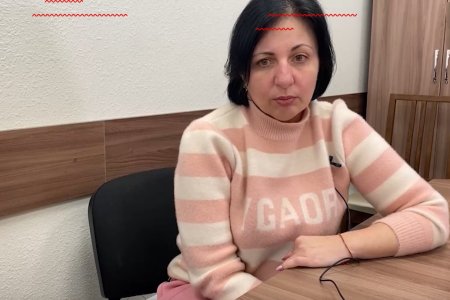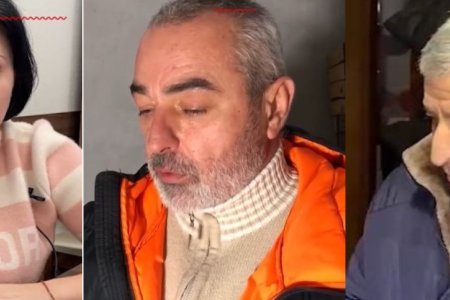
Russia’s Southern District Military Court has passed a second huge sentence against a Ukrainian abducted from occupied Melitopol yet charged with a supposedly ‘thwarted’ plan to kill Sergei Aksyonov, Russian-installed Crimean leader. The sentence against Volodymyr Bodnar (b. 1974) was Act II, following the 10-year sentence against Oksana Shevchenko. The third and final act is likely to be an effective death sentence against Volodymyr Ananiev, who is 74, disabled and in poor health.
The 13-year maximum-security [‘harsh-regime’] sentence was passed on 23 June 2025 by ‘judge’ Konstantin Igorevich Prostov. He ordered that Bodnar serve the first three years in a prison, the harshest and most restrictive, of Russian penal institutions, with the remainder in a prison colony. He also imposed a steep 500 thousand rouble fine. Since the FSB claimed to have ‘thwarted’ a planned attack at the beginning of February 2024, with a video showing Bodnar’s supposed ‘confession’, they surely must acknowledge that he has been imprisoned for at least 18 months. There is no way of knowing the real period of captivity, since the FSB very often hold civilians for months or even years before admitting to their detention and formally ‘detaining’ them.
There have been several occasions where videoed ‘confessions’, almost certainly extracted through torture, differ radically from the later indictment and conviction. The differences here are not, perhaps, so dramatic, but nor is it clear why, if three people were supposedly ‘caught’ in February 2024, there were three, seemingly, rather different ‘trials’
The court’s press service claimed it had been established that Bodnar “and other individuals, not identified by the investigators, had voluntarily joined an organized group where Bodnar had to “recruit new individuals to carry out criminal activities and be in charge of their actions”.
He and another unnamed member of this alleged ‘organized group’ were supposed to carry out surveillance of Aksyonov’s likely places to be visited, his routes and methods of transport in order to subsequently carry out “a terrorist attack on him”.
He was alleged to have, “from 24 February to 8 May 2023, while in Zaporizhzhia, recruited a woman, informing her of the plan drawn up for their “joint criminal activities”. During this same period, Bodnar was supposed to have received an explosive device and additional elements from a member of this ‘organized group’ and to have kept them until 8 May 2023.
He was also purportedly instructed to set up a secret hiding place in a means of transport; place the explosive device and additional elements in it and “to illegally transport these to Simferopol, which he did.” He was then alleged to have gone from Simferopol to a house in occupied Henichesk on 22 January 2024 and to have removed three bags containing seven mobile telephones, as well as means for detonating the explosive device. He then continued to study where he could place the bomb, including Aksyonov’s home. Somewhere around this time, the detonator, etc, are claimed to have been found and the plan to kill Aksyonov was thwarted.
Like in Shevchenko’s case, one of the charges was more serious than that reported in February 2024, with Bodnar charged under Article 205 § 3b (a terrorist act, but one “leading to the death of a person). It is not clear why this charge is cited as this was an allegedly thwarted attack. The article is also supposed to lead to a sentence of 15 to 20 years’ imprisonment. There was also an explosives charges under Article 222.1 § 4.
In February 2024, the FSB had claimed that they had thwarted a plan by Bodnar; Shevchenko and Ananiev, working for Ukraine’s Security Service. It was asserted that all three were Russians, and that all three had admitted to the charges, although only Bodnar was shown ‘confessing’. During the video, Bodnar got flustered at one point, as though he could not remember what he was supposed to say, with this in contrast to the suspicious speed with which he reeled off the rest, as though it had been learned by heart. Bodnar said that he had been told by SBU officers to take “an explosive device of American or German make” to Melitopol which he allegedly did. He claimed that he had cut a hole out of a gas cannister and placed what he called ‘a mine’ in it, wrapped this in a rag and carried it to Crimea. To do this, he would have needed to pass through some very rigorous Russian checkpoints.
It was learned on 14 May 2025 that Oksana Shevchenko had been sentenced to ten years by ‘judge’ Denis Vasilievich Stepanov from the same Southern District Military Court. She too was ordered to pay a 500 thousand rouble fine. There had been virtually no hearings, so presumably she agreed to admit the charges, with that very likely to have been under pressure, threats or, possibly, the promise (clearly broken) of a lighter sentence.
While there is next to no information about Bodnar and Shevchenko, 74-year-old Volodymyr Ananiev is a civic activist who is well-known in Crimea. Since he and his wife had been living for some time in Kyiv, it is fairly unlikely that he had ever set eyes on Bodrar and Shevchenko before they were all claimed to have been plotting to kill Aksyonv.
As well as being Russia’s oldest Ukrainian political prisoner, Ananiev has serious health issues, including high blood pressure, spinal problems, hernias, and has undergone glaucoma and other eye operations. He needs medication on a daily basis with restrictions on such medication or refusal to provide it at all constituting medical torture. Even the FSB did not hide the fact that Ananiev walks with a stick, due to problems with his joints.
It was also unclear why he was seized since, away from the propaganda media, he was charged, for the first ten months, only with ‘the illegal purchase, transfer, sale, possession or movement of explosive devices’ under Article 222.1 § 1 of Russia’s criminal code. In November 2024, however, a second charge was added of abetting in the planning of ‘a terrorist attack’ (Article 205.1).
His ’trial’ is now underway at the same notorious Southern District Military Court, with the court not naming the judge.



